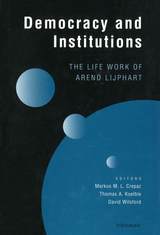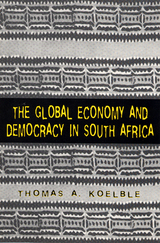3 books by Koelble, Thomas A.

Democracy and Institutions
The Life Work of Arend Lijphart
Markus M. L. Crepaz, Thomas A. Koelble, and David Wilsford, Editors
University of Michigan Press, 2000
Institutions are the channels of political power. This volume explores Arend Lijphart's life work--the design of political institutions. All the contributors to this volume share the fundamental insight that the design of political institutions matters in how democracies work.
The essays in this volume offer both theoretical insights into the context and implications of Lijphart's ideas and empirical exploration of the ideas. Two chapters by Thomas Koelble and Andrew Reynolds examine and apply Lijphart's insights to South Africa, while another study by Jack Nagel explores the fascinating institutional changes taking place in New Zealand. Essays by Bernard Grofman and Rein Taagepera examine Lijphart's work from a theoretical perspective and place Lijphart's work in the wider neo-institutionalist school of thought. Milton Esman applies the principle of power-sharing to mobilized communities, not only in democratic societies but also to those which are governed by authoritarian rule. Bingham Powell offers an empirical approach to the crucial question of the connection between political institutions and responsiveness of policy-makers. Markus M. L. Crepaz and Vicki Birchfield argue that in this age of globalization, countries with consensual political institutions will not only systematically refract the pressures of globalization but will be able to absorb the domestic consequences of globalization more successfully than majoritarian countries. Finally, Arend Lijphart responds to the arguments made in these essays, extending and adding novel concepts and insights to his conceptual framework.
The book will be of interest to political scientists, lawyers, and sociologists who study institutions, the impact of electoral systems, and constitutional design. In addition, those who study "globalization" will be attracted by the relevance of domestic political institutions and their refractory effects as the tides of globalization wash against the domestic shores.
Markus M. L. Crepaz is Associate Professor of Political Science, University of Georgia. Thomas A. Koelble is Associate Professor of Political Science, University of Miami. David Wilsford is President and Professor, the Institute for American Universities.
[more]

The Global Economy and Democracy in South Africa
Koelble, Thomas A.
Rutgers University Press, 1998
Democracy differs dramatically in First and Third World countries. Academic debate in the West focuses on democractic institutional arrangements and concepts such as elections, freedom of association, and freedom of speech, and little attention is paid to the content of emancipatory policy. In the Third World and especially in South Africa, emancipation and socio-economic redistribution are more important aspects in the popular perception of what democracy means than considerations of how political institutions function. These variations put regimes such as the ANC-led government on a collision course with the West.
Arguing that a consolidation of democratic institutions depends on a redistribution of resources, Thomas Koelble analyzes two crucial policy arenas-housing and education-to clarify the enormous problems facing the current South African government. For successful consolidation of institutional democracy in South Africa, Western political and financial institutions must provide support for that redistribution. Without their support, the ANC constituency's expectations that democracy will improve the quality of life will go unrealized, and the government may fail.
Koelble also posits that while the new South African constitution encompasses aspects of a consensus oriented system in terms of its federal structures and various rights to minorities, it is a system dominated by one large political party that is not constitutionally required to share power. He suggests that the ANC would have better served the cause of democracy had it included rather than excluded their opposition from political power. This majoritarian rule may deteriorate into another version of "race politics". Such race politics will have deleterious effects on both South Africa's polity and economy.
[more]

The Left Unraveled
Social Democracy & the New Left Challenge in Britain & West Germany
Thomas A. Koelble
Duke University Press, 1991
In the early 1980s both the British Labour Party and the West German Social Democrats (SPD), confronted with serious internal challenges from the political left, experienced an erosion of support that resulted in the emergence of new political parties—the British Social Democratic Party and the West German Green Party. Explicitly comparative, this study presents a theoretically innovative analysis while offering a sophisticated understanding of the political confrontations between social democrats, the new left, traditional socialists, and trade unionists in both Britain and West Germany.
By focusing on the established parties rather than on external developments, Koelble departs from conventional methodology regarding the fortunes of political parties. In examining the fundamental processes of decision making and coalition building within the SPD and the Labour Party, he argues that it is the organizational structures within parties that shape political results by setting limits, creating opportunities, and determining strategies.
By focusing on the established parties rather than on external developments, Koelble departs from conventional methodology regarding the fortunes of political parties. In examining the fundamental processes of decision making and coalition building within the SPD and the Labour Party, he argues that it is the organizational structures within parties that shape political results by setting limits, creating opportunities, and determining strategies.
[more]
READERS
Browse our collection.
PUBLISHERS
See BiblioVault's publisher services.
STUDENT SERVICES
Files for college accessibility offices.
UChicago Accessibility Resources
home | accessibility | search | about | contact us
BiblioVault ® 2001 - 2024
The University of Chicago Press









